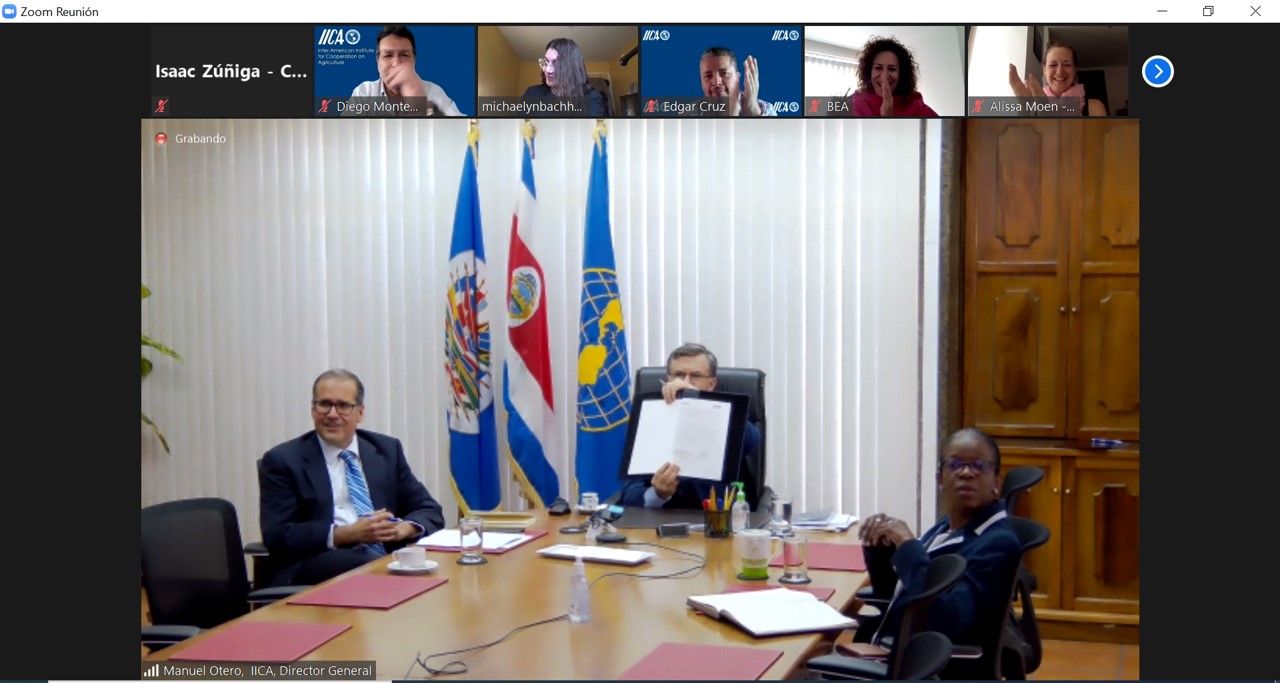Both institutions have signed a cooperation agreement, which at first will focus its actions on the producers of the coffee, cocoa and sugarcane chains of Mexico.

San José, 29 March 2021 (IICA). The Inter-American Institute for Cooperation on Agriculture (IICA) and the civil society organization Solidaridad have signed an agreement to strengthen knowledge management and develop tools to foster the resilience, sustainability and livelihood of coffee, cocoa and sugar cane producers from Latin America and the Caribbean.
The five-year partnership agreement was signed by the Regional Director and Legal Representative of Solidaridad for Central America, Mexico and the Caribbean, Michaelyn Baur, and the Director General of IICA, Manuel Otero
Initially, the activities will focus on producers from the southeast of Mexico.
“Our goal is to combine efforts so that we can achieve more significant, longer-lasting impacts at the national and regional levels. We seek to open more doors and opportunities, and carry out interventions that can foster transformation, transfer experiences from one country to another and from one chain to another, and find technology solutions that will strengthen the livelihood of producers while mitigating environmental impacts, generating resilience and contributing to food security”, said Baur during the virtual signing ceremony.
Manuel Otero, Director General of IICA, added that these types of synergies have become increasingly important, particularly in these times when more inter-cooperation is required to solve the challenges faced by the agricultural sector, and to ensure profitability and the well-being of farmers and their families, “who are so direly in need of it”.
“We are eager to engage in exchange activities and find more common ground, while working together to bring this agreement to life and avoid disappointing the farmers and the Ministries of Agriculture. My only goal is to ensure a better future for our producers and for rural areas; we need profitable, equitable and prosperous areas to promote sustainable development”, said Otero.
In Mexico, the coffee, cocoa and sugarcane chains cover about 1.6 million hectares in areas with high vulnerability to climate change, and directly employ nearly one million producers, many of whom live in communities with high poverty and marginalization rates.
The Regional Director of Solidaridad and the Director General of IICA stressed that the cooperation agreement intends to expand these initiatives to the rest of the Americas and scale them up as well.
During the signing of the agreement, the parties also expressed their intention to execute future actions to promote sustainable livestock production.
Key to establishing this alliance was Bayer Crop Science, with which both Solidaridad and IICA have cooperation agreements in force.
“These types of agreements fit very well with Bayer’s vision of improving the lives of all farmers through science, especially smallholder producers who often do not have the knowledge or technical assistance to carry out their projects, and are therefore left behind. They cannot reach the minimum quality of life standards because they lack support”, explained Beatriz Eugenia Arrieta, Regional Manager of Food Chain Value at Bayer Crop Science
Mrs. Arrieta went on to say that “we are present across Latin America, supporting and assisting producers through the Health for All, Hunger for None scheme, which is available to all of you, and which includes the knowledge, technology and innovation developed by Bayer for farmers, crops and for livestock production. We must execute actions to make this a reality”.
About Solidaridad
Solidaridad is a global network based in the Netherlands, with 50 years of experience in sustainable development. It has initiatives in nearly 50 countries and its main areas of work include poverty alleviation, environmental protection and business development for small- and medium-sized enterprises through the comprehensive and inclusive management of more sustainable value chains
Solidaridad brings together the various stakeholders of the supply chains, from farmers to processing or trading companies, workers and market players, with a focus on inclusive and sustainable production and consumption.
In Central America, Mexico and the Caribbean, it manages and implements programs to improve the sustainability of the supply chain in key agricultural sectors, including those of coffee, cocoa, livestock, sugar cane and oil palm.
More information:
Institutional Communication Division of IICA.
comunicacion.institucional@iica.int











